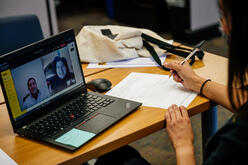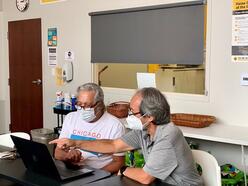
Since 2017, the Digital Inclusion (DI) program at International Rescue Committee (IRC) in Salt Lake City has operated to ensure all families and individuals welcomed to Salt Lake City have a broadband internet connection, devices to access the internet, and basic digital literacy. The IRC in Salt Lake City partners with programs like Comcast Internet Essentials to provide high-speed internet to households at a significantly reduced rate. Donations of laptops and tablets from community supporters and partners ensure access to a household device, sometimes ensuring multiple devices for larger families. The Digital Inclusion staff working alongside trained community volunteers help newly arrived families build digital skills and understanding to complete schoolwork, apply for jobs, attend meetings, and more.
Nassef Mohsen Ali, digital inclusion coordinator at the IRC in Salt Lake City, defines digital literacy as the ability to use the internet and internet devices that are all around us. He explains how our world is so intertwined with the internet and digital devices that many tasks that used to be done on paper or in person, now require digital literacy.
As a part of the Digital Inclusion program, Nassef and his team focus not only on building digital understanding and skills for newly arrived refugees, but also ensure all families have a computer and broadband internet. “We make sure that there is a household device for each case that comes our way, we get them set up with the computer, we get them set up with an email and password, and then we do what’s called a DI intake,” Nassef says.

During the DI intake, individuals participate in two parts. “One is the digital skills assessment which provides us a baseline of where they are at the start of their digital literacy journey,” Nassef explains. “There are some questions that we ask – do you know how to turn on a computer, do you know how to charge a computer, how to save a document on the computer?”
The assessment helps the Digital Inclusion team understand where they can focus efforts to provide support. In the second part of the intake, the team can address the gaps and help families gain understanding.
For Nassef, this is the real fun part: “We show the family how to use their computer and email, and how to open up Zoom and screen share. Because we are in this pandemic, we want to make sure that new arrivals are able to attend any online ESL classes or attend any meetings with their IRC point of contact.”
After the intake, the Digital Inclusion team continues to work in partnership with other programs at the IRC in Salt Lake City, supporting refugees and other new Americans to navigate the digital world and accomplish a variety of tasks from attending school or workshops to starting or operating a small business.
Although many things have shifted to virtual format during the pandemic, the IRC in Salt Lake City began focusing on digital inclusion years before the outbreak. “The pandemic didn’t create this digital literacy problem,” Nassef reminds, “It’s always been there.” Nassef hopes to provide more than one device to families in the future, as more things are done online, and multiple family members may need to use a computer at the same time.
In the coming months, the IRC in Salt Lake City expects to welcome 615 Afghan Humanitarian Parolees evacuated to safety in addition to more than 600 refugee arrivals from around the world. New or like-new laptop, tablet and smartphone donations will be critical to fulfilling the needs of our newest neighbors. Learn more about our current needs at Rescue.org/DonateSLC or by emailing us at DonateSLC@Rescue.org.
